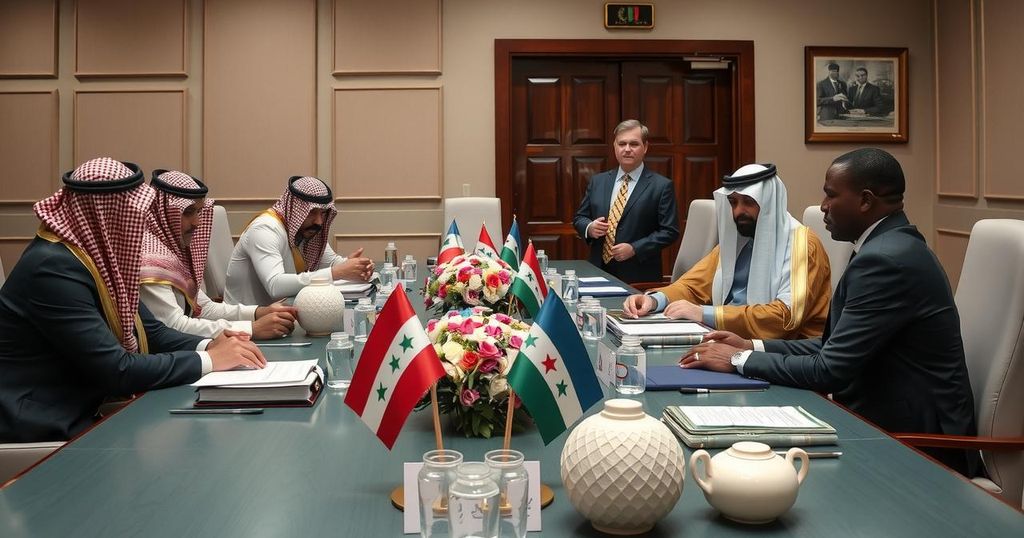Arab and EU Diplomats Meet in Saudi Arabia to Discuss Syrian Support

Arab and EU diplomats are convening in Riyadh for discussions centered on Syria, following the recent leadership changes and calls for sanctions relief. The talks comprise two sessions, one for Arab officials and another involving global representatives. The European Union may consider lifting sanctions if the new Syrian government commits to inclusive governance.
On Sunday, high-ranking diplomats from the Arab nations alongside their European counterparts convened in Riyadh, Saudi Arabia, to deliberate on the ongoing issues in Syria. The dialogues are structured into two distinct sessions: the first dedicated to Arab officials, followed by a session involving international representatives from Turkey, France, the European Union, and the United Nations. This meeting comes in the wake of Ahmed al-Sharaa’s ascendance as Syria’s new leader after the recent overthrow of Bashar al-Assad, igniting discussions around potential sanctions relief.
The context of these discussions is deeply rooted in over thirteen years of a devastating civil war in Syria, which has led to the loss of more than half a million lives and the displacement of millions, contributing significantly to the refugee crisis affecting Europe. The Western powers, notably the United States and the European Union, had imposed sanctions on the Assad regime due to its violent suppression of peaceful protests in 2011. As the new leadership seeks normalization, the European Union is contemplating the possibility of alleviating these sanctions provided that the new government takes steps towards inclusivity and the protection of minority rights in Syria.
The Syrian conflict, ignited by peaceful demonstrations against President Bashar al-Assad’s rule in 2011, has since escalated into a brutal civil war marked by significant human suffering. The ramifications of this conflict are profound, contributing to an ongoing humanitarian crisis and affecting regional and global stability. As the situation evolves with the emergence of new leadership under Ahmed al-Sharaa, there is a pressing need for international dialogue to address Syria’s future, the potential for government reforms, and the plight of millions displaced by the conflict. The presence and involvement of major global powers in these discussions serve to highlight the critical nature of the situation, as well as the potential for a shift in diplomatic relations and economic sanctions against the Syrian government.
The diplomatic meetings in Saudi Arabia signify a pivotal moment in the quest for stability in Syria following years of conflict and humanitarian crisis. While the new Syrian leadership endeavors to foster a more inclusive government, the discussions among Arab and European diplomats may pave the way for lifting sanctions that have lingered since the early stages of the civil war. The road ahead necessitates a focus on governance reforms that protect minority populations, ensuring that Syria can progress towards recovery and peace.
Original Source: www.scmp.com








